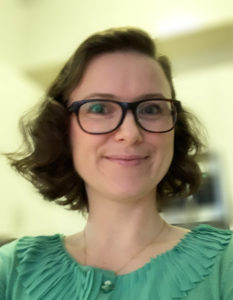 Alexandra Zidovska is an Associate Professor of Physics at the Center for Soft Matter Research in the Physics Department at New York University. She received her PhD from the University of California, Santa Barbara after she completed her undergraduate studies and M.Sc. at Technical University of Munich, Germany. She pursued her postdoctoral studies at Harvard University. Prof. Zidovska held the prestigious Damon Runyon Cancer Research Fellowship, was named Whitehead Fellow 2016 and is a recipient of the National Institutes of Health Pathway to Independence Award, National Science Foundation CAREER Award and Michele Auger Award in Biophysics 2020. Her current research uses approaches from soft condensed matter physics and polymer physics to study the cell nucleus and its constituents, such as the genome and subnuclear bodies, in particular their dynamics and spatial organization. She is also passionately engaged in causes related to diversity and inclusion in physics and related sciences. Her lab has an impressive record of recruiting, training and promoting women scientists across all levels, and Prof. Zidovska is founder and faculty leader of a new group, NYU Women in Physics dedicated to providing a more welcoming and stimulating environment for women and those from other underrepresented groups in physics. Find out more on her lab website.
Alexandra Zidovska is an Associate Professor of Physics at the Center for Soft Matter Research in the Physics Department at New York University. She received her PhD from the University of California, Santa Barbara after she completed her undergraduate studies and M.Sc. at Technical University of Munich, Germany. She pursued her postdoctoral studies at Harvard University. Prof. Zidovska held the prestigious Damon Runyon Cancer Research Fellowship, was named Whitehead Fellow 2016 and is a recipient of the National Institutes of Health Pathway to Independence Award, National Science Foundation CAREER Award and Michele Auger Award in Biophysics 2020. Her current research uses approaches from soft condensed matter physics and polymer physics to study the cell nucleus and its constituents, such as the genome and subnuclear bodies, in particular their dynamics and spatial organization. She is also passionately engaged in causes related to diversity and inclusion in physics and related sciences. Her lab has an impressive record of recruiting, training and promoting women scientists across all levels, and Prof. Zidovska is founder and faculty leader of a new group, NYU Women in Physics dedicated to providing a more welcoming and stimulating environment for women and those from other underrepresented groups in physics. Find out more on her lab website.
Read her article ‘Mechanical stress affects dynamics and rheology of the human genome’.
How do you feel about Soft Matter as a place to publish research on this topic?
I am very excited to have our paper on the genome’s dynamics and rheology published in Soft Matter. It is a great journal showcasing the interdisciplinary nature of the field of soft matter by bridging physics, chemistry and biology. My group focuses on understanding the genome as a polymer inside the cell nucleus in live cells, which is research at the interface of physics and biology. Hence Soft Matter is a great place to share our results with the scientific community.
What aspect of your work are you most excited about at the moment and what do you find most challenging about your research?
What I find most exciting about my research is also its most challenging part, that is, understanding the physics behind the dynamical self-organization of the genome and the cell nucleus in vivo. Inside living cells we can see first hand how nature relies on physical principles to carry out biological functions. In my group, we perform experiments on live human cells, obtaining measurements of physical parameters that then inform our physical picture of the genome and the cell nucleus. Such experiments are quite challenging, as their design is nontrivial given the complex nature of a living cell. Yet, that’s what I personally find very exciting, when we learn new physics directly from peering and poking into the cell.
In your opinion, what are the most important questions to be asked/answered in this field of research?
In my opinion, one of the big questions in my field is to understand the non-equilibrium nature of the genome and the emergent phenomena it leads to. The dynamical self-organization of the genome affects all cellular processes via the central dogma of biology, hence its understanding is critical for revealing the physics of life. I believe that these living systems can teach us new non-equilibrium physics.
Can you share one piece of career-related advice or wisdom with other early career scientists?
My advice would be, when identifying scientific questions to study, choose those you are sincerely passionate about and that make you happy. Your enthusiasm for the problem will then help to fuel your motivation and energy, even when you encounter obstacles.










